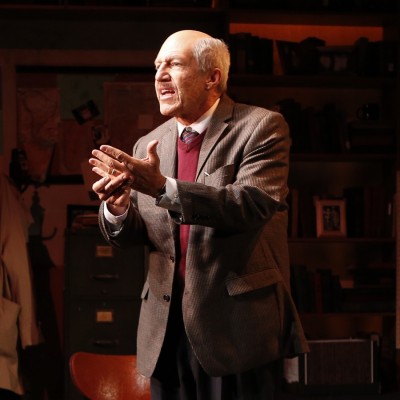Wiesenthal
Written and performed by Tom Dugan, Presented by Royal Manitoba Theatre Centre, Plays at Tom Hendry Warehouse until Dec. 5
Simon Wiesenthal is one of the 20th century’s most compelling historical characters. Born in 1908, Wiesenthal was one of the few Austrian Jews to survive the Holocaust. After the war, he dedicated his life to hunting down and bringing to trial the escaped Nazi war criminals who were responsible for the genocide.
His work helped bring more than 1,100 Nazis to trial, including Adolf Eichmann (the Holocaust’s primary architect) and Karl Silberbauer (the SS staff sergeant who arrested Anne Frank). For nearly 60 years, he carried out this task with benevolence, humour and the occasional historical embellishment.
Playwright and actor Tom Dugan created Wiesenthal, a one-man play in which he stars as the title Nazi hunter. The character of Wiesenthal recounts his life story, philosophizes on the nature of crimes against humanity, and emphasizes the need for altruism in the search for justice.
He does this all with humour and aplomb whilst working away in his office on his search for Alois Brunner, Adolf Eichmann’s assistant who was granted asylum by the Syrian government and employed by them as a torture expert until his death in 2010.
Dugan’s portrayal of Wiesenthal is warm and vicarious in the best possible way. Anyone lucky enough to have had grandparents, friends or neighbours of Wiesenthal’s age from his part of Europe will instantly recognize those people in his performance. That recognition works from a character perspective, but it’s also a thematic function. It’s in tandem with Wiesenthal’s (and the play’s) message that we must see ourselves in those we’re at odds with.
Maybe the people Wiesenthal reminds us of were victims of the Holocaust. Maybe they were perpetrators or bystanders. They were undoubtedly affected by war and Dugan wants the audience to see this.
The format is a familiar one in which a single actor portrays a historical figure. The most famous example of this is probably Hal Holbrook’s Mark Twain Tonight. Wiesenthal is one of several such plays that Dugan has written. Other subjects have included Robert E. Lee, Frederick Douglass and Mary Lincoln.
But there’s something stirring and provocative in the idea of giving Wiesenthal the Mark Twain treatment. It suggests a role in history and a cultural influence for Wiesenthal that few have yet to assign him. Positioning him onstage as an iconic figure in this theatrical tradition makes a case for his influence on how we see the Holocaust in retrospect, and how we approach both crimes against humanity and the processes of justice and reconciliation. It also positions Wiesenthal as a historical personality or character, akin to people like Twain or Abe Lincoln, people whose dispositions have become part of the broader cultural consciousness.
Ultimately, it was a pleasure to spend 90 minutes with this character. It never felt like a performance or a lecture. It was a conversation, in the same way that great stand-up comedy is a conversation between a performer and their audience. It wisely recognizes that humour is a unifier and not, as so many claim, a divider. As Wiesenthal says at one point, “If we’re busy laughing, we might forget to kill each other.”
Published in Volume 70, Number 12 of The Uniter (November 26, 2015)







